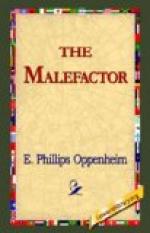“Oh! Wingrave’s all right, I believe,” he said, “it’s only his manner that puts you off a bit. He’s just the same with everyone! I don’t think he means anything by it!”
Lady Ruth shivered, but she said nothing. Just then Aynesworth came up, and with a motion of her fan she called him to her.
“Please take me into the other room,” she said “I want a glass of champagne, and on the way you can tell me all about America.”
“One is always making epigrams about America,” he protested, smiling. “Won’t you spare me?”
“Tell me, then, how you progress with your great character study!”
“Ah!” he remarked quietly, “you come now to a more interesting subject.”
“Yes?”
“Frankly, I do not progress at all.”
“So far as you have gone?”
“If,” he said, “I were to take pen and paper and write down, at this moment, my conclusions so far as I have been able to form any, I fancy that they would make evil reading. Permit me!”
They stood for a few minutes before the long sideboard. A footman had poured champagne into their glasses, and Lady Ruth talked easily enough the jargon of the moment. But when they turned away, she moved slowly, and her voice was almost a whisper.
“Tell me this,” she said, “is he really as hard and cold as he seems? You have lived with him now for four years. You should know that, at least.”
“I believe that he is,” Aynesworth answered. “I can tell you that much, at least, without breach of faith. So far as one who watches him can tell, he lives for his own gratification—and his indulgence in it does not, as a rule, make for the happiness of other people.”
“Then what does he want with us?” she asked almost sharply. “I ask myself that question until—I am terrified.”
Aynesworth hesitated.
“It is very possible,” he said, “that he is simply making use of you to re-enter the world. Curiously enough, he has never seemed to care for solitude. He makes numberless acquaintances. What pleasure he finds in it I do not know, but he seldom avoids people. He may be simply making use of you.”
“What do you think yourself?”
“I cannot tell,” Aynesworth answered. “Indeed I cannot tell.”
She left him a little impatiently, and Aynesworth joined the outside of the circle of men who had gathered round Wingrave. He was answering their questions readily enough, if a little laconically. He was quite aware that he occupied in society the one unique place to which princes might not even aspire—there was something of divinity about his millions, something of awe in the tone of the men with whom he talked. Women pretended to be interested in him because of the romance of his suddenly acquired wealth—the men did not trouble to deceive themselves or anyone else. A break up of the group came when a certain great and much-talked-about lady sent across an imperative message by her cavalier for the moment. She desired that Mr. Wingrave should be presented to her.




